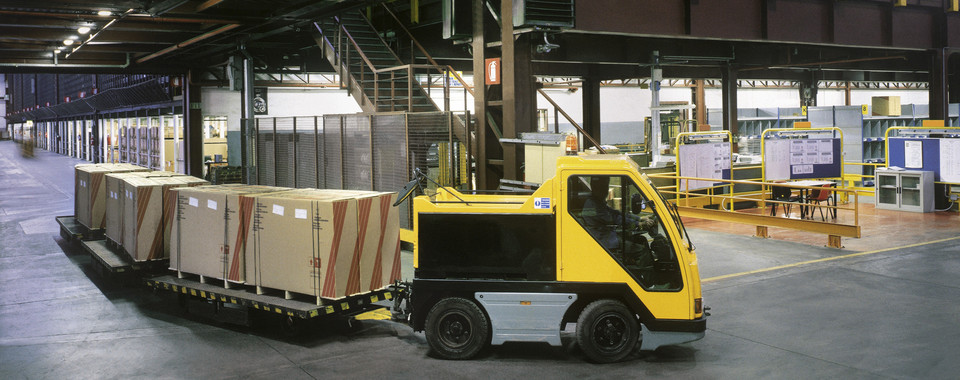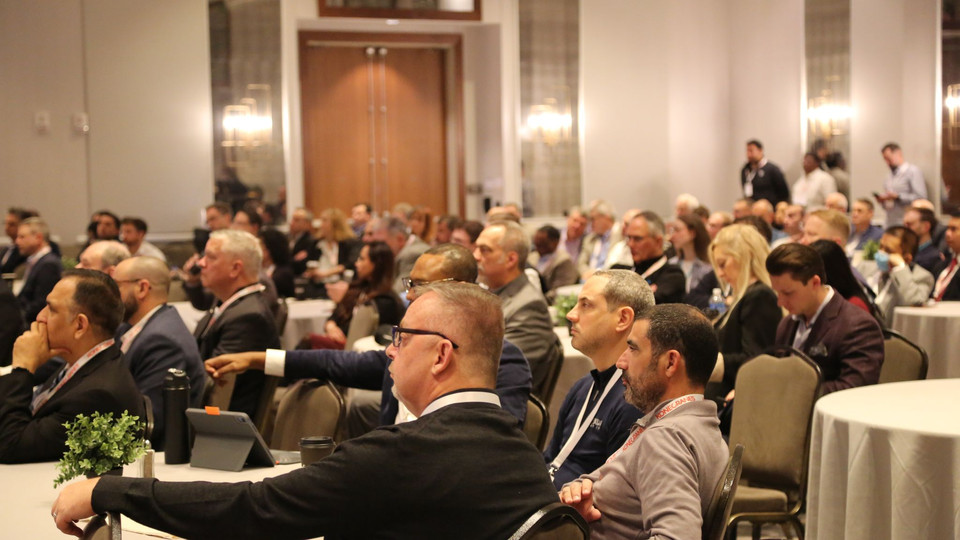
Apr 14, 2025 // Zdravka Ley
More than just in a circle: How tugger trains are changing internal logistics thanks to intelligent management
Why intelligent tugger train optimization is crucial.
Feb 25, 2025 Kira Biernat
ShareThe Port Technology Summit has wrapped up, but even weeks later, some key takeaways are still ringing in our minds. One of the closing remarks that still stands out to me: ports and terminals are sexy. No, really—despite the cold meeting rooms and endless coffee refills, there’s something undeniably exciting about seeing industry minds come together to tackle the biggest questions in maritime logistics. But are we talking about the right things?
One of the first things asked at the conference was simple but powerful: What are the most important topics for ports and terminals? It’s a fair point. Sometimes, we get so caught up in buzzwords and emerging tech that we forget the industry’s real pain points. The overarching theme of this year’s discussions was clear: tech is great, but it has to solve real problems.
Frank Kho from ATAI made a sharp observation: Don’t invent problems that don’t exist. In many industries, particularly fast-moving consumer goods, creating needs to sell products is standard practice. Marketers manufacture urgency so they can offer a solution—it’s clever. But in container terminals, that mindset doesn’t work. As Leslie Ruta from the Port of Corpus Christi pointed out, terminals don’t want to be confronted with technology that doesn’t make sense for them. Instead of chasing the latest buzzwords, the focus should be on addressing genuine operational challenges with solutions that actually fit.
Don't invent problems that don't exist.
That’s something we at INFORM think about constantly when working with terminals. The goal isn’t to push innovation for its own sake but to apply it where it delivers measurable value. And while the industry is always looking ahead, the real impact often lies in the now. A sentiment that echoed throughout many sessions of the conference was the importance of using existing data to solve existing challenges rather than seeking new solutions for the sake of innovation. Terminals don’t need more complexity disguised as progress—they need to maximize the potential of the data and tools already available to them. It’s a refreshingly pragmatic approach in an industry where new technology is often marketed as a game-changer before proving its worth.

Speaking of data, it was a hot topic throughout the summit. A lot of discussion revolved around whether ports and terminals have the right data, whether they have enough of it, and—perhaps most importantly—whether they even need as much as they think they do. And of course, the concept of data cleansing came up. I think it was during the panel discussion on the question "How ports can achieve seamless integration with the growing intermodal supply chain" when someone jokingly said something in the matter of, Before you clean your data, maybe ask how it got dirty in the first place. A humorous change of pace but also a valid point—before terminals invest in expensive solutions to clean up their data, they should consider how to improve its quality at the source.
And all that talk of data and AI aside, Yvo Saanen from Portwise raised an important point that often gets overlooked in discussions: We shouldn’t forget the importance of spontaneous events at terminals. Container terminals are unpredictable by nature—weather, vessel delays, and unforeseen disruptions all play a role. While technology can optimize planned operations, it’s people who bring the ability to react in real time. Their experience, intuition, and ability to quickly assess and adapt to changing situations make them indispensable when unexpected events occur. This highlights an important balance—while data is a valuable tool for streamlining processes, the human factor remains crucial in ensuring resilience and agility in terminal operations.
But how did the data get dirty?

At the end of the day, this year’s Port Technology Summit reinforced one crucial truth: there is no one-size-fits-all solution for terminals. Each operates under different conditions, faces unique challenges, and has distinct priorities. Forcing technology where it doesn’t fit? That’s a surefire way to create frustration and waste investment. Technology holds real value, and as Soufyane Meftah from Wabtec put it during a heated discussion, only by recognizing its worth can the industry truly embrace it. That’s why events like this matter—they provide a platform for meaningful exchanges between suppliers, ports, and terminals, helping everyone find the solutions that truly make a difference.
And honestly, if the fascinating insights hadn’t kept me going throughout the week, the food certainly would have. From Southern comfort classics to authentic Mexican flavors, the variety was impressive—I almost felt like I had stumbled into a gourmet cooking conference instead of a logistics summit. And as we all well know, nothing fuels conversations quite like a plate of incredible food (and a strong cup of coffee).
The INFORM team is already looking forward to continuing the exchange, challenging assumptions, and ensuring that innovation is always driven by real industry needs. Until next year!
About our Expert